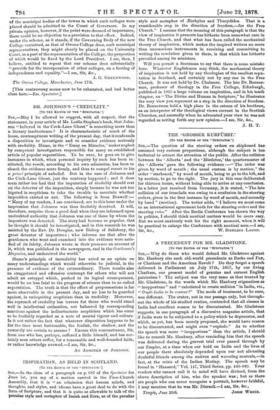INSPIRATION, AS HELD IN SCOTLAND. [To THE EDITOR OF THE
..SPEOTATOR.1 SIR,—In the close of a paragraph on p. 687 of the Spectator for June 1st, you say of a motion carried in the Free-Church Assembly, that it is " an admission that human minds, and thoughts, and styles, and idioms have a great deal to do with the form of Scripture, and that it is quite as allowable to talk of the peculiar style and metaphor of Isaiah and Ezra, as of the peculiar style and metaphor of .lschylus and Thucydides. That is a considerable step in the direction of freedom,—for the Free Church." I assume that the meaning of this paragraph is that the view of inspiration it presents has hitherto been somewhat rare in the Free Church, and that what has been called the mechanical' theory of inspiration, which makes the inspired writers no more than unconscious instruments in receiving and committing to writing the revelation given to them, is that which has hitherto prevailed among its ministers.
Will you permit a Scotsman to say that there is some mistake here. Whatever Englishmen may think, the mechanical theory of inspiration is not held by any theologian of the smallest repu- tation in Scotland, and certainly not by any one in the Free Church. It was not held by Dr. Chalmers. The late Dr. Banner- man, professor of theology in the Free College, Edinburgh, published in 1865 a large volume on inspiration, and in his tenth chapter, on "The Divine and Human in Scripture," he illustrates the very view you represent as a step in the direction of freedom. Dr. Bannerman held a high place in the esteem of his brethren, as an interpreter of the theological views current in the Scottish Churches, and assuredly when he advocated your view he was not regarded as setting forth any new opinion.—I am, Sir, &c.,
J. H. T.


































 Previous page
Previous page